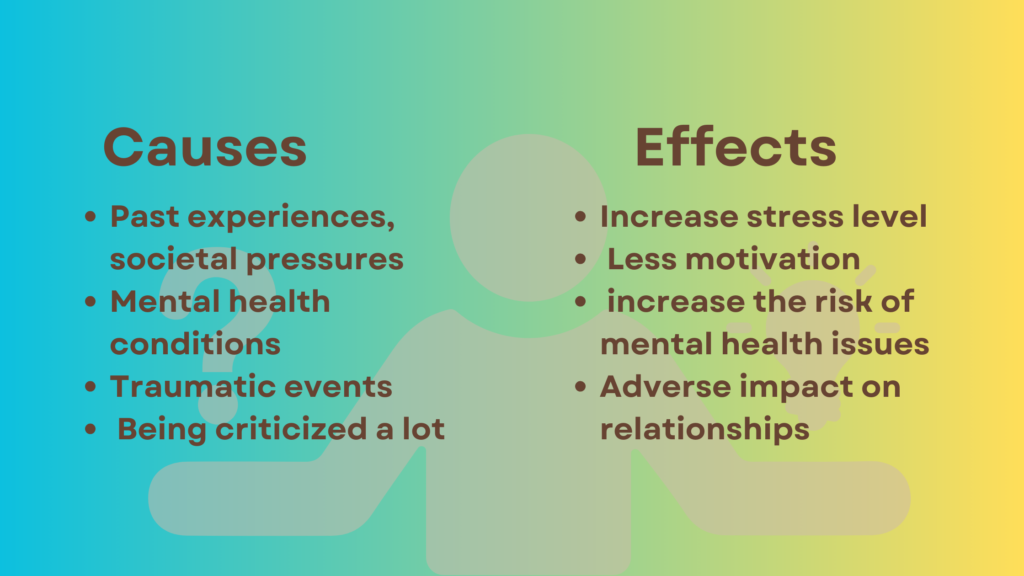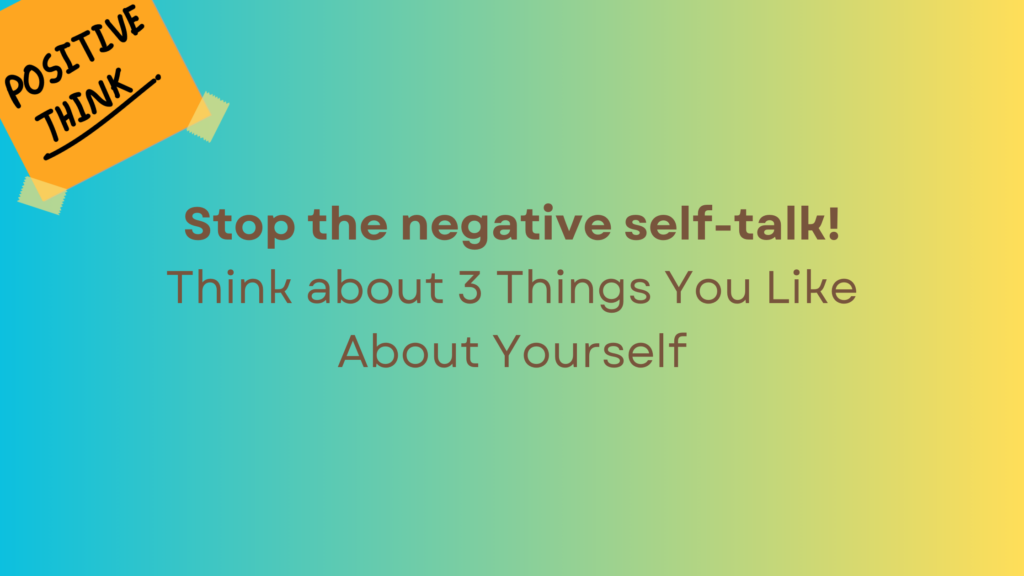Are you bothered by Negative, Unwanted Thoughts?
Mindfulness is one of the most powerful tools for managing negative thoughts. It enables us to observe our thoughts without judgment and decide how to react.
Negative self-talk is a common challenge many people face and is becoming a significant barrier to personal happiness and success. Most people have over six thousand thoughts on average in a day and 80% of them are negative.
Understanding what negative self-talk is, why it happens, and its impact can help us deal with this self-destructive habit. In this comprehensive guide, we will explore the various aspects of negative self-talk, including identifying its patterns and implementing strategies to overcome them.
This guide will also discuss the impact of negative thoughts on individuals’ mental health, relationships, and overall well-being.
Understanding Negative Self-Talk
The term negative self-talk refers to the inner dialogue that criticizes or demotivates oneself. It often manifests as a negative inner voice in your head that frequently highlights your flaws while ignoring your strengths. This negative inner conversation can significantly impact your self-esteem and confidence.
According to a study, negative self-talk is not just a bad habit; it’s a reflection of our core beliefs about ourselves that have developed over time
Identifying negative self-talk patterns is essential for making a change. These patterns involve thinking in extremes (either everything is perfect or terrible), overgeneralization, and emphasizing negative aspects while ignoring the positive ones. Recognizing these patterns enables us to challenge and alter them.
Causes and Effects
Negative self-talk has many varied and complex causes. They can stem from past experiences, societal pressures, or mental health conditions. For instance, individuals with anxiety or depression often engage in negative self-talk.
Further, traumatic events or being criticized a lot can also give birth to negative thinking about yourself.
The effects of this negative self-talk have far-reaching. It can increase stress levels, less motivation, and increase the risk of mental health issues. Moreover, it can adversely impact relationships by affecting communication and the ability to stay positive.
Personal Reflection
Self-reflection is an effective tool for understanding why we are hard on ourselves. Negative self-talk sometimes arises from chasing perfectionism or internalizing the fear of failure. Asking yourself why we set such high standards and where these beliefs come from can help us understand ourselves better.
It is natural to have occasional negative thoughts about yourself; while persistent negative thoughts can lead to various problems such as low self-esteem or a mental health disorder. Therefore, it is pivotal to pay attention to the frequency and intensity of negative self-talk as it can give insights into our mental health.
Strategies to Overcome Negative Self-Talk
Overcoming negative self-talk requires a variety of approaches. Given below are some strategies recommended by various therapists:
- Fixing Self-Hate: Start with self-compassionate practices. Acknowledge your feelings without judging them and treat yourself with the same kindness you would give to your friend.
- Stopping Negative Self-Talk: Challenge your negative thoughts by asking yourself “if they are true”. If not, replace them with more logical and constructive thoughts.
- Using Tools for Pushing Back Against Negative Self-Talk: Using tools like journaling, cognitive-behavioural therapy (CBT), and mindfulness can help you identify your thought patterns and alter them.
- Therapist’s Strategies: Therapists often recommend techniques like reframing negative thoughts, setting achievable goals, and building a strong support network.
- Improving Mood: Doing the activities that you enjoy and that make you feel good can also help in shifting your negative mindset to a positive one.
- Creating a Kinder Mind: Practice self-affirmations and focus on your strengths and achievements instead of your failures.
- Mindfulness: Mindfulness teaches us to observe our thoughts without getting controlled by them. This can be particularly helpful in dealing with negative self-talk.
Related: Life Awakening: Mindful Living Journey
Dealing with Negative Thoughts
When you have negative thoughts, it is crucial to decide whether to ignore them or face them. However, ignoring these negative might be a temporary solution, but to deal with them requires finding the root cause of these negative thoughts and replacing them with something constructive.
Besides, diverting yourself from negative thoughts can be effective. You can divert your mind from self-criticism by engaging in activities that need focus and concentration.
If we think negatively, do negative things happen?
The idea that negative thoughts bring negative outcomes is known as the “law of attraction.” Though not scientifically proven, it is crucial to accept that our mindset can influence our actions and reactions.
You can watch Hussein Hariri’s TEDx talk here for a case study or real-life example.
Hussein Hariri, a motivational speaker and coach, delivered a compelling TEDx talk at TEDxAl Sanawbar Youth titled “Empowering Inner Dialogue: Overcoming Negative Self-Talk.” In his talk, Hariri shared personal anecdotes and practical strategies to combat negative self-talk and cultivate a positive inner dialogue.
Building Resilience Against Negative Self-Talk
Resilience is the psychological quality that enables certain people to bounce back stronger after facing tough times in life. Similarly, building resilience against negative self-talk involves developing a robust inner dialogue that can handle life’s challenges. Here are some ways to build resilience:
- Positive Support Network: Build strong connections with the people who uplift you. Positive reinforcement from others can help you counterbalance your negative thoughts.
- Self-Care Practices: Regular self-care activities can make you feel good and reduce stress. This can bring positivity and help you avoid negative self-talk.
- Achieving Small Goals: Setting and achieving small goals can boost your self-esteem and reinforce a positive self-image.
Related: Living on Purpose: Key Strategies
- Learning from Experiences: Instead of criticizing yourself for your mistakes, focus on what they taught you. This can transform negative thoughts into a learning opportunity.
By incorporating these activities into your daily life, you can not only combat negative self-talk but also enhance your overall well-being.
Frequently Asked Questions (FAQs) about Negative Thoughts
What is Negative Self-Talk and why does it matter?
Negative self-talk refers to the inner conversation that criticizes or demotivates yourself. This internal conversation can significantly impact your self-esteem and confidence. Identifying negative self-talk patterns is crucial for change. Recognizing these patterns allows us to challenge and alter them.
What are the examples of negative self-talk?
Examples of negative thoughts include, “I’ll never be good enough,” “They probably think I’m stupid for saying that,” and “That situation will surely turn out badly.”
Is it normal to have occasional negative thoughts about yourself, or could this be indicative of a larger problem?
Occasional negative thoughts about oneself are normal; however, when these thoughts become frequent, it could indicate a larger problem such as increased stress level, less motivation, and increased risk of mental health issues. Therefore, it is pivotal to pay attention to the frequency and intensity of negative self-talk as it can give insights into our mental health.
Is it better to ignore negative thoughts or deal with them?
When you have negative thoughts, it is crucial to decide whether to ignore them or face them. However, ignoring these negative might be a temporary solution, but to deal with them requires finding the root cause of these negative thoughts and replacing them with something constructive.
What are negative thoughts called?
Negative thoughts are sometimes known as cognitive distortions. These are thinking patterns that can lead to negativity and cause problems like poor self-esteem, anxiety, and depression.
What are the 3 Cs of negative self-talk?
The “3 Cs” of negative self-talk are comparing, criticizing, and catastrophizing. These are common patterns that can create a negative self-image.






I really liked this blog.. Nicely explained.. ❤👏🏻
An excellent read that will keep readers – particularly me – coming back for more! Also, I’d genuinely appreciate if you check my website Webemail24 about Roofing. Thank you and best of luck!
I just read this article, and I’m truly impressed by its depth and clarity. The insights on managing negative thoughts and self-talk are both practical and empowering. I especially appreciate the emphasis on mindfulness and self-compassion as tools for fostering a positive inner dialogue. This guide offers valuable strategies that can genuinely help individuals enhance their mental well-being. Thank you for sharing such a thoughtful and comprehensive resource!
This article is a fantastic resource for anyone struggling with negative thoughts. The practical advice and strategies are both insightful and easy to implement. Kudos for such a thorough and helpful guide!
Such an enlightening read! The focus on mindfulness and self-compassion is spot on. This guide offers real solutions for transforming negative thoughts into positive actions. Well done!
I found this guide to be extremely helpful. The strategies provided are straightforward and effective for managing negative self-talk.
A very useful read! The advice on handling negative thoughts is both practical and actionable. It’s been a great help.
Very practical advice! This article is a fantastic resource for anyone looking to handle negative thoughts more effectively.
mariatogel
Thank you for every other excellent post. Where else could
anybody get that kind of info in such a perfect means of writing?
I have a presentation next week, and I’m on the search for such information.
pragmatic demo pragmatic demo pragmatic demo
pragmatic demo
Hi everyone, it’s my first go to see at this
site, and piece of writing is genuinely fruitful designed for me,
keep up posting these articles.
zeus138 zeus138 zeus138
zeus138 zeus138
Thanks to my father who informed me on the topic of this website, this website is actually awesome.
tumi123 tumi123 tumi123 tumi123 tumi123
Nice respond in return of this question with firm arguments and explaining all concerning
that.
ligaciputra ligaciputra ligaciputra ligaciputra ligaciputra
An outstanding share! I’ve just forwarded this onto a coworker who was conducting a little research on this.
And he actually ordered me breakfast because I discovered it for him…
lol. So allow me to reword this…. Thanks for the meal!!
But yeah, thanx for spending the time to talk
about this topic here on your web site.
Good article. I am facing a few of these issues as well..
Hurrah! Finally I got a web site from where I
can genuinely take valuable information regarding
my study and knowledge.
I was recommended this website by my cousin. I’m not sure whether this post is written by him as nobody else know such detailed about
my trouble. You are wonderful! Thanks!
I like the valuable information you supply in your articles.
I’ll bookmark your weblog and test once more right here regularly.
I am relatively certain I’ll learn many new stuff right right here!
Best of luck for the following!